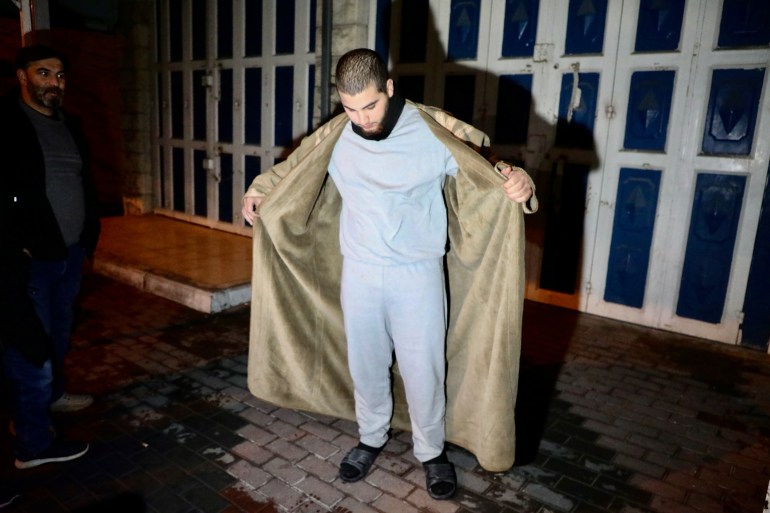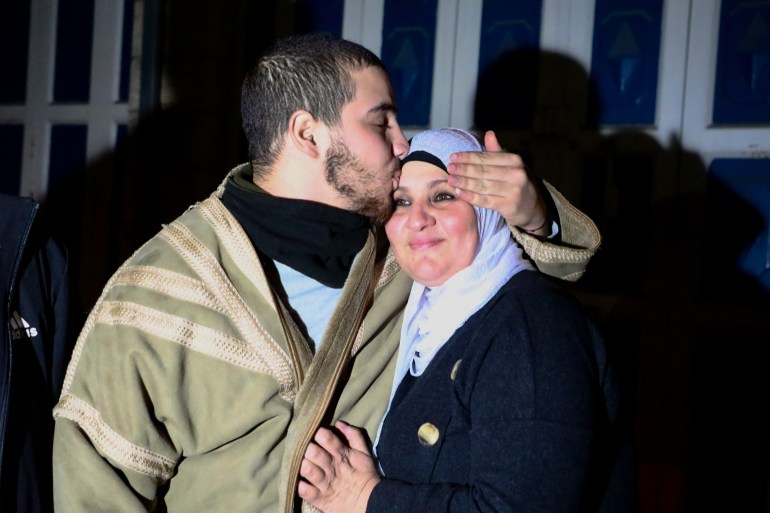Hebron, occupied West Bank – After eight months in Israeli prisons without being charged or processed, 18-year-old Mohammad Salhab Tamimi was finally able to return to his family as part of an ongoing prisoner exchange deal.
His boyish face was serious as he embraced his parents and stood, slightly bewildered, as if he was unsure whether to speak to the press or not.
He had been through a lot in the past eight months of uncertainty, torment that only increased since the start of the Al-Aqsa Flood operation on October 7.
The last thing he was told by the forbidding Israeli prison guards was that he would be rearrested and put back into the limbo of administrative detention if his family and friends showed any signs of celebrating his return.
“’Tell your friends [they said]’… If we have a big celebration, I will return to prison,” he recalled.
Wary of the Israeli military checkpoint and illegal settlement next to their home, his family kept their happiness on mute, with only the immediate family and some uncles present.
Shackled, kicked around, humiliated
Luckily for the family, smiles don’t make any noise, and nobody could stop the smiles on his mother Fatima and father Murshid’s faces as they held tightly to their “little boy”.
Their boy was among the fourth batch of Palestinian prisoners to be released from Ofer prison near Ramallah in the small hours of Tuesday overnight. Up to the last minute, he had not been sure what was happening to him.
At 7am (05:00 GMT) on Monday, November 27, a guard at Rimon Prison demanded that Mohammad get ready to be transferred to Ofer Prison. That was all; nothing about the reason why he was being moved. Just told to strip off completely, put on just a grey prison sweatsuit, and gather all his belongings.
“I put my clothes in one of those plastic envelopes and walked to the cell door where they cuffed my hands and forced my head down so I was looking at the ground.
“The officer then kicked me, hard. His boots have steel in them, so it felt like he crushed my feet, it really hurt.
“He dragged me to the prison yard but, as he was dragging me out of the prison, he stopped to take my clothes from me and threw them into a garbage pail. Then, cursing me with obscene language, he dragged me out,” Mohammad recalled haltingly.
Mohammad was loaded into a prisoner transfer vehicle known as a “bosta” – a van with blacked-out windows and tight cells with metal seats, to which prisoners are chained.
Bosta rides can take 12 hours or more. There are no rest stops, food, or toilet breaks. “I was kept in the vehicle cell without anything to eat or drink until after midnight,” said Mohammad.

His father and uncle were standing there outside Ofer, waiting for him, when he was finally released in the wee hours on Tuesday so they could drive him home to Hebron in the south of the occupied West Bank.
A decision to humiliate
Things were more unpleasant than usual in prison after October 7, which was when Hamas launched a surprise attack from Gaza on southern Israel killing some 1,200 people.
People held in several institutions have reported severe beatings, denial of medical attention, lawyer and family visits, yard time, electricity, water, and hygiene essentials from the prison shop.
At least six Palestinian prisoners died or were killed in Israeli custody since October 7, including some shortly after their arrest.
Israel’s relentless bombing of the Gaza Strip after the Hamas attack lasted 48 days and killed more than 15,000 Palestinians, including more than 6,000 children.
On the 49th day, Friday, a four-day “humanitarian pause” negotiated by Egypt and Qatar began. Both sides said they would release captives – Hamas would release batches of people it took captive on October 7 in return for three times as many Palestinians held – with and without cause – in Israeli detention facilities.
As the exchanges continued and optimism rose, the truce was extended by two days to keep the exchanges going.

Over the same days that it released some 150 Palestinian detainees, Israel arrested 133 people, nearly as many, from the occupied West Bank and East Jerusalem, according to Palestinian prisoner associations. Since October 7, Israel carried out 3,290 arrests in the same areas, which it has occupied since 1967.
Mohammad is not the first released person to say that there is extreme overcrowding in Israeli prisons.
“There were 10 prisoners shoved into cells that only had six beds. We used to have to spread blankets or something on the floor to sleep,” he said.
The amount of food they were given was insufficient, as it was also for six prisoners, not 10. The cellmates had to ration what food they got carefully.
Several prisoners were injured one day as well, Mohammad said, when prison guards attacked two sections of Rimon Prison
Aside from injuries and the reported deaths, Mohammad said: “The [Israeli] occupation had pretty much decided that they would humiliate the prisoners, ever since the outbreak of Al-Aqsa Storm.”
Cut off from any news of the outside world, the detainees found themselves stripped of almost everything, including all possessions that were in their cells like utensils and appliances, they used to make things a little more pleasant. They were deprived of buying hygiene supplies, including laundry detergent, and barred from using the washing machines to wash their clothes.
Prison authorities also kept the prisoners away from their only outlet to let off some steam – the “fora”, or prison yard, and prevented them from making any noise.
“I used to love making the call to prayer from inside my cell so the whole section could hear, but that too was forbidden.
“It felt like they didn’t want us to even breathe.”


